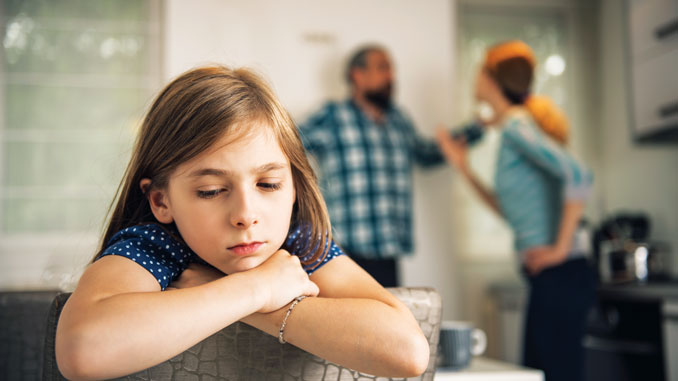
Most divorces are filed in January, leading the month to be dubbed “National Divorce Month”
“Honey, we need to talk.”
The statement is rarely followed by good news. And while that phrase is likely the one that started divorce talks between you and spouse, it’s a good one to re-use when it’s time to tell the kids what’s going on. It’s a statement that most of us are familiar with, particularly if your parents decide to go through a legal separation or to start the process of going through a divorce.
“Being honest and keeping it simple and age appropriate can limit the effects of divorce on children,” says Cathy Mangaoang-Welsh, a licensed clinical social worker and outpatient care coordinator for St. Joseph’s Behavioral Health Center.
If you’re getting ready to have a tough talk about divorce with your kids, keep these expert tips in mind. Kids may respond with a range of confusing emotions, but it’s to be expected. After all, for them, this is a confusing time. It’s also worth noting that some divorces can be messy, so it might be worth visiting http://petersmay.com/, for example, to see if they can offer any guidance to ensure that your divorce is as smooth as possible for your child’s sake.
“Divorce is a difficult process for the whole family,” Cathy acknowledges. “Several changes are happening and the children may feel as though their whole world has crashed.” While there are so many important factors to consider within a divorce, like the Cost Of Divorce, for example, it is important to focus on maintaining a positive environment for your children.
Be a team.
Just because you’re choosing to go your separate ways romantically doesn’t mean your partnership should end. In fact, for the sake of the children, maintaining a positive relationship is key. Co-parenting is still your job.
“Breaking the news of divorce to children is best done together, if able with the ex-partner. By communicating divorce together it can symbolize that although the dynamics of the family are changing, the family will continue to support each other,” Cathy says.
If kids press as to why this is happening, don’t point fingers. Acknowledge a mutual understanding of an unhealthy, unhappy relationship. Children don’t need the details.
Communicate.
Ongoing communication is important. Let children have their feelings and respect their space but frequently check in. “Don’t pressure them to talk,” Cathy says. “Check in with them, ask how they are feeling, what do they think of their new room, let them know that both parents will have routines. Ask for any ideas that could be helpful for them during this difficult time.”
“We don’t want to ignore children’s thoughts or feelings, so allow them to share however they can safely.”
Strive for consistency.
Divorce represents a time of change. Some kids handle it better than others but it’s never easy. Kids often have to move, or start splitting time between two homes. Their schedules are not the same.
Keep consistency where you can. Let kids stay in their same school or same activities as before. While they are going through your divorce they may rely on those close to them to cope and taking those relationships and hobbies away can hurt. It’s also important that consistency exist between homes. Communicate with your ex to maintain a standard or rules that are similar to the rules kept before, and ensure that rules are not vastly different from one household to another.
“Parents must work at rebuilding new family dynamic,” Cathy says.
Let children be children.
While you’re hurting, it may be tempting to make your child your confidant but this is never appropriate. Vent to your friends, DO NOT complain to children about your (former) spouse. You could truly harm the relationship between them and their other parent, and that’s not fair.
“Do not speak poorly of the ex-partner,” Cathy warns. “We don’t want children to feel they have to choose a side.”
Show love.
Children have a tendency to blame themselves when a parental relationship goes awry. Obviously your divorce is not your children’s fault, but how do you let them know that? Cathy says to emphasize this fact early and often. Tell them often how loved they are and reiterate that mommy and daddy both love them the same as always.
Seek counsel.
Some children may express a desire to talk to someone. A professional may be the right call, especially if they are demonstrating difficulty adjusting to the change or if the divorce is particularly messy or complicated. An outside grownup skilled at helping adolescents process their feelings could make a big difference in your child’s life. Children from divorced homes are more likely to have psychological problems than children who lose a parent to death. You may want to discuss how best to go about helping your child with this. Some parents may ask their attorney’s how this can be done through the proper channels, whether you have a family law attorney in jacksonville florida or one in Texas, there are different ways in which this can be handled and they may be able to shed some light in this area.
Divorce By the Numbers
The number of couples in America who divorce – 50%
The average length of a marriage that ends in divorce- 8 Years
The average age of adults going through their first divorce- 30 Years Old
The average number of years a person waits to remarry- 3 Years
How much more likely a child is to develop health problems after divorce versus two-parent families- 50%
How much more likely a person is to commit suicide when they come from a broken home- 50%



